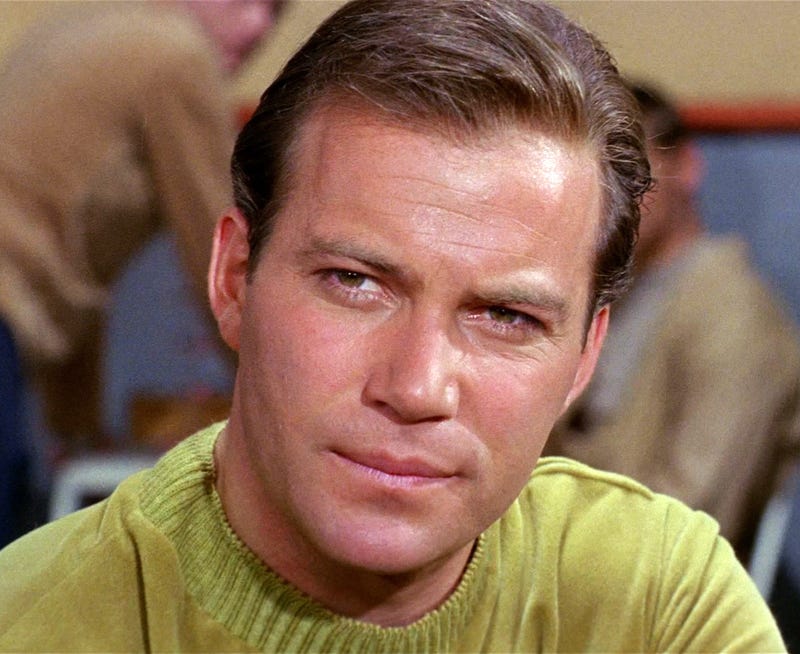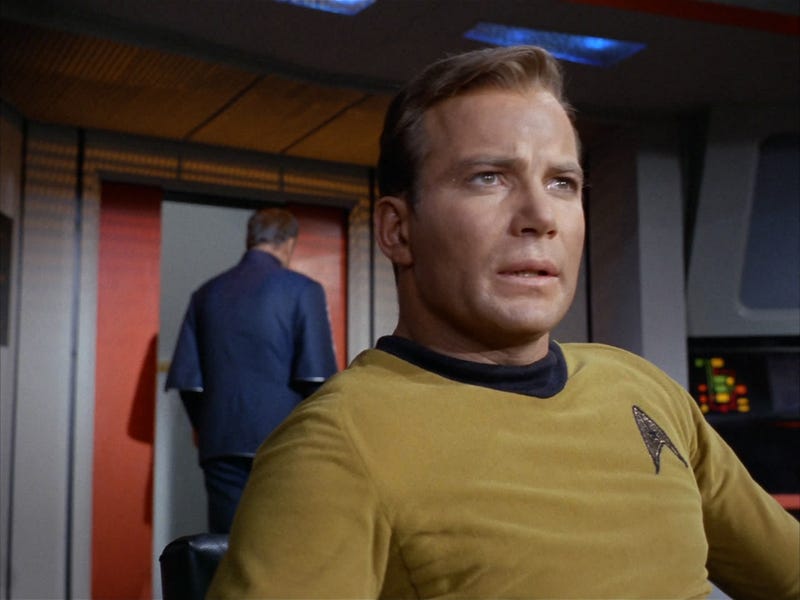
James T. Kirk owes a lot to his space opera forebears, characters like Buck Rogers, Flash Gordon and the Lensmen: He wears a cool uniform, has a fancy ray gun strapped to his hip, flies the fastest ship in the galaxy, and has a weird alien sidekick. Yet the character of Kirk has outstripped his predecessors.
Why has Captain Kirk remained an icon when Buck Rogers and Flash Gordon have faded?
One might say that Kirk had an advantage, being introduced on television, while the others were introduced in print—but then I’d point out Sherlock Holmes, Tarzan and Superman all started in print. There have been several attempts to bring Flash Gordon and Buck Rogers to the screen, but their staying power has always been limited.
Also, other science fiction TV characters have also not had the longevity enjoyed by Kirk. His contemporaries Admiral Nelson of the Seaview and John Robinson of the Jupiter 2, and his successors like John Sheridan of Babylon 5 and whoever those guys were on Stargate are consigned to the used DVD bin of history. Kirk is different for a lot of reasons, and having just written his “autobiography” I’ve spent a lot of time trying to figure out why. Some of it is luck, but most of it is due to the creativity of his creators, who overcame the limitations of producing television in the 1960’s by striving harder, and accidentally produced the ever-lasting gobstopper of science fiction heroes. Here are seven reasons why he’s lasted:
1) He’s from the future, but also the Old West.
In the 1960’s, the western was king on television, so in creating his science fiction hero, Gene Roddenberry made him an American cowboy. (It’s ironic that the original actor Jeffrey Hunter, star of “The Searchers”, was less-successful casting.). But rather than just putting a cowboy hat on his head and a piece of straw in his mouth, Roddenberry and his writers came up with a clever twist. Kirk was a kind of future scholar on all things American; he doesn’t just stand in for America as a cowboy, he celebrates it. In Kirk’s era, the United States of America is thing of the past; it plays no role in the Federation.

Yet the original series is rife with Kirk referencing his ancestors of the American West, his idolization of Abraham Lincoln, and in one episode, “The Omega Glory,” he’s so into the Constitution he’s got the preamble memorized. So Kirk’s reverence for this extinct country and its history is a message to the U.S.: “You matter. You’re part of something great.” It connects to a large portion of the audience, because he’s complimenting us, and telling us that the American ideal will survive.
2) He’s the ultimate revenge of the nerd.
Flash Gordon was a Yale graduate and world-renowned polo player (or if you like the 1980 version, quarterback for the NY Jets). Buck Rogers was a WWI veteran who surveyed mines. What was Kirk before he was captain? A nerd.
That’s right: Throughout the original series and into the movies, the description we get of Kirk as a young man differs starkly from the man we’ve come to know. In “Where No Man Has Gone Before,” his best friend Gary Mitchell describes him when they were cadets as a “stack of books with legs.” In “Shore Leave,” Kirk describes himself as a too serious student who was made “positively grim” at the bullying of Finnegan. So the man we know in the series, the rough-and-tumble starship captain began life as a picked-on geek. This allows a large portion of the audience to connect with him (I’m not just talking about nerds; even bullies themselves have been bullied). Flash and Buck gave us no way in, while Kirk is a real wish-fulfillment: he has become what we’d all like to become, confident and charismatic, even though he started out just like us.

3) He plays the field, but isn’t happy about it.
Flash Gordon had Dale Arden, Buck Rogers had Wilma Deering, Kim Kinnison had Clarissa MacDougall (and their kids had each other, but we won’t get into that). Who does Kirk have? Just about anyone he wants, it turns out.
This, again, was probably due to the nature of television at the time; leading men, whether they were cops or doctors or lawyers or private detectives, or in this case, spacemen, were often left unencumbered by marriage so they could get entangled romantically one week, only to be free the next week to do it again. And though the creators of Star Trek could’ve left this alone and made Kirk a unrepentant space Casanova, they instead added a layer: in “The Naked Time,” we find out Kirk ached for love and a relationship, but that his commitment to his job got in the way. In “The City on the Edge of Forever,” his duty forces him to let the love of his life die. And in Star Trek II: The Wrath of Khan, we find out his job kept him away from his son.

This angst sets Kirk apart from the science fiction heroes, and also from many television heroes—we never heard a thing about Joe Mannix, Jim Phelps or Marshall Matt Dillon wishing they could settle down with the right woman, or facing angst over the strain of their job. It allowed the audience to eat its cake and have it to: we both enjoyed his romantic adventures, but every once in a while were told he wasn’t content, which also made us feel better about our humdrum dating and work life.
4) He’s proud about where he went to school.
In the original proposal for Star Trek, this is first sentence that describes the Kirk character (then named Robert April): “The “skipper”, about thirty-four, Academy graduate, rank of captain.”
Kirk’s education was important to Roddenberry, and throughout the series, Kirk constantly references the Academy: the classes he took, the professors he had, the papers he was required to read. But when we think about it, the guy’s thirty-four, he’s still talking about college. There isn’t another action hero anywhere who was so into his education (We know Flash Gordon went to Yale, but that was only in the sixth panel of the first comic, I don’t think it was mentioned again.) But, unlike the space cadet school described in the opening of “Galactic Patrol”, this Academy was far from a perfect institution. There’s hazing of lower classmen, people get kicked out (R. M. Merrick), they might have you stay too long and that could ruin your career (Ben Finney), and you can be an asshole and still graduate. I’m not referring to Finnegan, because we don’t know if he graduated; I’m referring to Commodore Wesley, who decides when his friend Jim Kirk loses his ship to a machine in “The Ultimate Computer,” to call him a “dunsel”, Academy slang for a useless piece of crap (watch that episode again, Wesley is being a total jerk).

Yet despite the imperfections of this educational monument, it’s important to Kirk, and its one more layer in the dramatization of this hero that makes him connect to us, especially to young people who watch Star Trek. Every kid is stuck in imperfect educational institutions themselves, yet also often identify with it and celebrate their struggle to get through it, investing in the hope that graduating will mean something later on in life. And Star Trek’s audience has also always been highly educated; we now see that this isn’t just due to the nature of the stories it told, but because it was important to its main character.
5) He makes mistakes.
I can’t think of a moment in the lives of Flash Gordon, Buck Rogers or Kim Kinnison where they questioned one of their own decisions, or made one that they found out later was incorrect. Kirk, on the other hand, screws up all the time. In “Tomorrow is Yesterday” he accidentally wrecks a fighter jet, then further complicates matters when he beams the pilot on board. In “The Apple,” he beats himself up for letting three crewmen die. In “Arena” and “Errand of Mercy” he realizes he was too quick to assume war was the solution. He also often questions his own judgment: on more than one occasion he apologizes to McCoy for losing his temper, and in one remarkable scene in “Balance of Terror” wonders if the decisions he’s making are completely wrong, and will bring the galaxy to war. Again, these are not the attitude and actions of a cardboard hero; the writers and the actor who portrayed him made Kirk vulnerable, and human, and also gave him the ability to learn from his mistakes.
6) He’s funny.
Flash Gordon, Buck Rogers and Kim Kinnison were never funny. They may have had lighthearted camaraderie with their cohorts, but they weren’t ever funny. Kirk however could make you laugh, both the actor and the character. Here’s what I mean by that distinction: Sometimes the position the character was in and his reaction to it was funny; deadly serious as tribbles fall from a hole in the ceiling, or convincing Spock to let him drive a 1920’s car. That’s the actor making you laugh; in most comedies the actors are playing it straight, and that’s why they’re funny.
The revelation about Kirk is, sometimes, however, the character himself would successfully make a joke; for example, at the end of “Friday’s Child” when he’s celebrating that the new leader of Capella is named after him, Kirk is actually funny. That’s a real accomplishment, for a character to have a believable sense of humor, and that’s due mostly to the seventh reason…
7) Casting
The first six reasons wouldn’t have meant a thing if the right guy wasn’t cast. Having worked in television for 27 years I know the marriage of actor to role is complicated and unpredictable, and the main reason we remember Kirk is because of William Shatner. And since Shatner himself has had no other role that’s as memorable, it really was kismet for the show, the actor and the audience that Kirk and Shatner found each other.

The conclusion is simple: the worlds of Flash Gordon’s Mongo and Buck Roger’s 25th Century are fun places to visit, mildly diverting for the moments we decide to engage with them. But the magic of Star Trek is its fans believe Captain Kirk and his world exists, even when we’re not watching it or reading about it, because the hero at the center has as much reality as possible for a fictional character. As a television writer, I envy that accomplishment. As a fan, I’m grateful for it.
David A. Goodman was a writer on Star Trek: Enterprise and wrote the Futurama episode “Where No Fan Has Gone Before.” He’s the author of the new book, The Autobiography of James T. Kirk, available now.